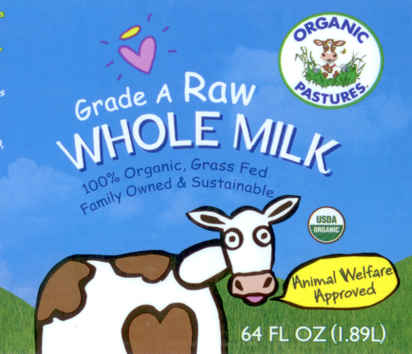
A brand of unpasteurized milk sold at the Blue Lake Rancheria is being recalled, after it has been linked to five cases of child E. coli infection over a space of three months.
Health officials are urging everyone to throw away all dairy products produced by Organic Pastures (logo above), with the exception of aged cheese. Though epidemiologists have not found infected samples of milk produced by the company, all five of the children studied were Organic Pastures consumers.
None of the children infected have died, though three of the five became seriously ill. There have been no known cases in Humboldt County.
The sale of raw milk is illegal in Humboldt County. A push to legalize it — led, in part, by Organic Pastures — failed earlier this year. Shortly afterward, Blue Lake Rancheria, which as a sovereign nation is not subject to county ordinances, announced that it would begin selling the product.
“The tribe wants to get the message out to anyone who has purchased those to dispose of any ones they have,” said Blue Lake’s Jana Ganion this morning. She added that the tribe would continue to follow state guidelines on raw milk sales.
Press release from the Department of Food and Agriculture follows:
SACRAMENTO, November 15, 2011 – Raw milk products produced by Organic Pastures of Fresno County are the subject of a statewide recall and quarantine order announced by California State Veterinarian Dr. Annette Whiteford.
Under the recall, all Organic Pastures raw dairy products with the exception of cheese aged a minimum of 60 days are to be pulled immediately from retail shelves and consumers are strongly urged to dispose of any products remaining in their refrigerators. Until further notice, Organic Pastures may not produce raw milk products for the retail market. The order also affects Organic Pastures raw butter, raw cream, raw colostrum, and a raw product labeled “Qephor.”
The quarantine order came following a notification from the California Department of Public Health of a cluster of five children who were infected, from August through October, with the same strain of E. coli O157:H7. These children are residents of Contra Costa, Kings, Sacramento, and San Diego counties. Interviews with the families indicate that the only common reported food exposure is unpasteurized (raw) milk from Organic Pastures dairy. Three of the five children were hospitalized with hemolytic uremic syndrome, a serious condition that may lead to kidney failure. There have been no deaths. Surveys indicate that only about three percent of the public report drinking raw milk in any given week so finding 100% of these children drank raw milk and the absence of other common foods or animal exposures indicates the Organic Pastures raw milk is the likely source of their infection.
While laboratory samples of Organic Pastures raw milk have not detected E. coli 0157:H7 contamination, epidemiologic data collected by the California Department of Public Health link the illnesses with Organic Pastures raw milk.
The great majority of milk consumed in California is pasteurized. Raw milk is not pasteurized. Pasteurization is a process that kills harmful bacteria. In California, state law requires that raw milk and raw milk products shall bear the following warning on the label: “Warning - raw (unpasteurized) milk and raw milk dairy products may contain disease-causing micro-organisms. Persons at highest risk of disease from these organisms include newborns and infants; the elderly; pregnant women; those taking corticosteroids, antibiotics or antacids; and those having chronic illnesses or other conditions that weaken their immunity.”
Symptoms of E. coli O157:H7 infection may include abdominal cramps and diarrhea which is often bloody. Most infected people recover within a week; however, some may develop complications that require hospitalization. Young children and the elderly are at highest risk for a potentially life-threatening complication known as hemolytic uremic syndrome (HUS), which includes kidney failure. People who develop symptoms of E. coli O157:H7 infection after consuming unpasteurized milk or milk products should consult their health care provider. Physicians who have patients suspected of having HUS or E. coli O157:H7 infections should report them to the local health department.
CDFA milk and dairy foods safety experts have begun a complete inspection at Organic Pastures dairy - of all facets of operations, from the cows to the bottling plant. Before the quarantine may be lifted, the facility must meet all sanitation requirements under state law. Additionally, raw milk products will be tested to ensure compliance with regulatory standards.
CLICK TO MANAGE